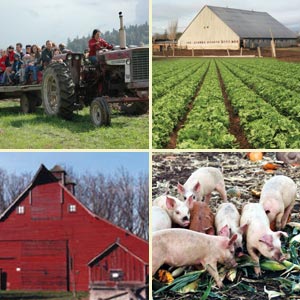Organic and sustainable: simple words, complex ideas
by Pamela Coleman, PCC Farmland Trust board member
This article was originally published in November 2008

As encroaching development converts more of Washington’s farmland into houses and shopping malls, we at the PCC Farmland Trust strive to preserve farms for future generations.
We also require that land is farmed “using organic, sustainable growing methods,” which results in a short, pithy mission statement and long, rambling discussions at board meetings. What exactly do we mean when we use the words organic and sustainable?
We can agree on the meaning of the word organic because organic standards have been defined by federal law. The word sustainable is more difficult to define.
Sustainability rests on the principle that we must meet the needs of the present without compromising the ability of future generations to meet their own needs. Farmers are less concerned with definitions and more concerned with their farm’s economic and environmental sustainability.
Farmers dedicated to sustainability will maintain the health of their animals by providing them with adequate space for exercise, access to the outdoors, and feed similar to their natural feed. They treat their animals with kindness. One farmer says, “These pigs [my pigs] are happy pigs!”
Cattle grazed on pastures mature at their natural age — without hormones to force them to grow faster. Chicken flocks are kept small, and manure is a valuable fertilizer for crops, rather than a waste product. A diverse farm maintains the health of the soil, the crops, and the livestock.
Although animals may be raised in a sustainable manner, their meat may be sold as organic only if they are fed organic feed throughout their lives and are processed in a certified organic facility. This increases the cost to the farmer and the consumer because organic feed is expensive and may not always be readily available, or because organic meat processors often are not available near the farm.
For these reasons, the farmers on PCC Farmland Trust property may not always have certified organic livestock, even though the land itself is certified organic. It is difficult and complex!
All the farms saved by the PCC Farmland Trust are certified organic and all our farmers employ agricultural methods that are responsible, humane, diversified and sustainable.
Each farmer acts as a good steward of the land, ensuring its viability for future generations. When we support these farmers, we also preserve the environment.
